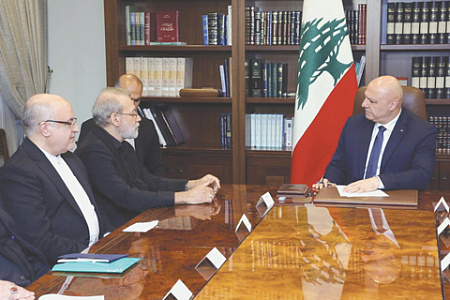
A high-stakes visit by a top Iranian official to Beirut has laid bare the growing rift between the Lebanese government and its long-time patron, Tehran, over the future of the powerful militant group Hezbollah. Ali Larijani, Secretary of Iran’s Supreme National Security Council, faced a notably cold reception on August 13, as Lebanese President Joseph Aoun delivered an unambiguous message: Beirut intends to assert a state monopoly on all weapons within its borders.
During a tense meeting at the Baabda Palace, President Aoun, a former army commander who took office in January, bluntly told Larijani that Lebanon rejects all foreign interference. “The lesson we have learned is that no party, without exception, can be allowed to carry weapons and rely on foreign forces,” Aoun stated, pointedly adding that decades of seeking external support had come at a great cost to the nation. While acknowledging a desire for cooperation with Iran, Aoun stressed it must be founded on mutual respect for sovereignty.
Larijani’s public statements attempted to smooth over the tensions. He conveyed greetings from Iranian President Masoud Pezeshkian and praised Aoun’s role in fostering national unity. Publicly, he affirmed that “Iran respects the decisions made by the Lebanese government.” However, in a subsequent meeting with Parliament Speaker Nabih Berri, a key ally of Hezbollah, Larijani’s tone shifted. He openly declared that Tehran opposes any specific timeline for Hezbollah’s disarmament, advocating instead for an internal Lebanese dialogue.
The visit comes at a critical juncture. On August 5, the Lebanese government ordered its army to develop a plan to disarm all militias, a direct challenge to Hezbollah. The Iran-backed group, severely weakened after losing an estimated 80% of its rocket arsenal in a recent two-month war with Israel, has rejected the initiative as an “unacceptable capitulation.” Hezbollah’s leadership insists its arms are necessary to defend Lebanese sovereignty, pointing to five strategic locations in southern Lebanon still occupied by Israel despite a ceasefire.
The Lebanese government, however, fears that Hezbollah’s intransigence could provoke another devastating conflict with Israel, which demands the group’s full demilitarization. Officials in Beirut and Washington are calculating that the recent war, combined with Iran’s waning regional influence, may have critically eroded public support for Hezbollah, even within its traditional Shiite base.
The chill between Beirut and Tehran was palpable. Larijani was met at the airport not by high-ranking Lebanese government officials, but by representatives from the Foreign Ministry, Hezbollah, the allied Amal movement, and Palestinian factions Hamas and Islamic Jihad. According to Bassam Mokdad, an analyst for the Lebanese newspaper Al-Modon, the situation in Beirut is extremely tense, with Hezbollah staging nightly motorcycle rallies in its strongholds as the Lebanese army erects checkpoints to contain them.
Mokdad notes that Hezbollah’s rhetoric has hardened, likely emboldened by Iranian officials publicly condemning the disarmament plan. This diplomatic turbulence is seen by some as part of a broader strategy. Larijani’s visit to Lebanon was part of a regional tour that also included Iraq, where he discussed the fate of other Iran-backed Shiite militias. Analysts suggest Tehran may be using this tough posture as leverage for future negotiations with the United States, even as its influence in capitals like Beirut faces an unprecedented challenge.
